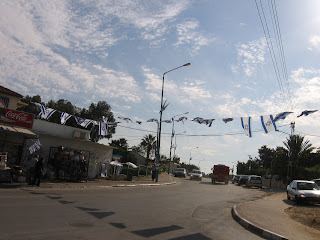Meandering through Israel’s upcoming election; by Tamar Boussi from Jerusalem
In the United States, we just finished a very long and somewhat angry election cycle and people have begun to put their differences aside and continue life normally. One of the great positives of democracies is their ability to change governments without violence and usually without bitterness. Yet different democratic countries have very different systems and all work fairly well.
Israel on Tuesday, January 27th began its official election cycle. This date is two weeks from election day and the first day that paid television advertising is allowed. The system in Israel is different from ours and since so many people have asked me, over the past years, "how does the Israeli system work" this seemed an appropriate time to talk about it. Imagine two weeks of political ads, vs the nearly 2 years of campaigning we have just finished.
Israel’s Knesset(Parliament) is unicameral and holds elections every 4 years. Voters choose their political party and vote in internal party elections to choose who will lead the party and a list of candidates, to hold Knesset seats, below the party leader. Voters pick a political party and pay a tax to the party to support it. The party decides who will be on the list and in what order, this becomes important when the general election occurs. The first name on the list will be the Prime Minister if that party gets the most votes and the names below the party leader are ordered according to the party’s judgement as to their importance to the party. For instance, if a party gets enough votes to earn 30 seats, the first 30 names become members of Knesset.
The President of Israel, currently Shimon Peres, then asks the leader of the party, who seems most likely to be able to form a government, to do so within 45 days. This is usually the party receiving the most votes, but not necessarily. Forming a government requires negotiating with other parties to form a coalition. . The cabinet ministers are members of coalition parties as well as the majority party, which sometimes creates volatility in the government. Imagine if President Obama had to insert Republicans, Green Party representatives, Independents and so on into his cabinet. While in the American system the cabinet is the pick of the President and they all work together, that is not always possible if some of your most important cabinet members are from other parties. Currently Ehud Olmert and Tzipi Livni are from Kadima but the Minister of Defense is from Labor and different cabinet members could have competed for the Prime Minister’s job in the past election and plans to do so in future elections. In the current Knesset there are 12 different parties represented (27 parties competed in the last election) and in the current election 38 parties are vying for seats.
A party must have 2% of the total votes to earn a seat. For most of the political parties this very low threshold is too high due to the number of parties involved. In the current election,the parties that will make up the next government will most likely be, the current ruling party Kadima, Likud (the current front runner), Israel Our Home, Labor, and Shas (a Sephardic religious party). Around half of the voting Arab citizens vote for left wing Jewish lists instead of any of the 5-7 Arab parties that put up a list. Also many Arabs boycott elections, which makes it difficult for them to get many seats, totaling the Arab parties together they usually pass the threshold and hold between 3 and 7 seats.
Polls show the top issues for voters are, first security, second the economy, third education. Although the elections for Knesset are set every four years very few governments have lasted a full term. In the last 10 years, four governments have formed, with three falling before their term is finished, the one that lasted was Ariel Sharon’s government from 2002 to 2006. In the last 60 years there has been only one government that received enough mandates to form a government without coalescing with other parties and it lasted only one year.
This can be a confusing system, but generally the parties have very clear differences and Israelis tend to be very loyal to a particular party. Since Israel has been at war for 60 years, every voter has concerns about security, after that the parties represent different strengths. Although the Likud has always been strong on defense, the leader of Likud, Benjamin Natanyahu is considered strongest on the economy, concerns about social issues such as poverty and education are strengths of Labor, although the religious parties are also strong on those issues as well as on the issue of maintaining Israel as a Jewish state. Israel Our Home is strong with new immigrants Jewish identity and defense. Meandering through 38 political parties is not a likely activity for most voters who will lean toward parties they have voted for in the past.
Whichever party receives the most votes will lead the government but will, of necessity, have to form a coalition with several other parties. These coalitions can create broader consensus, but often create differences that make decision making difficult.
This is Israeli elections 101, if you would like to know more feel free to contact me tboussi@yahoo.com



